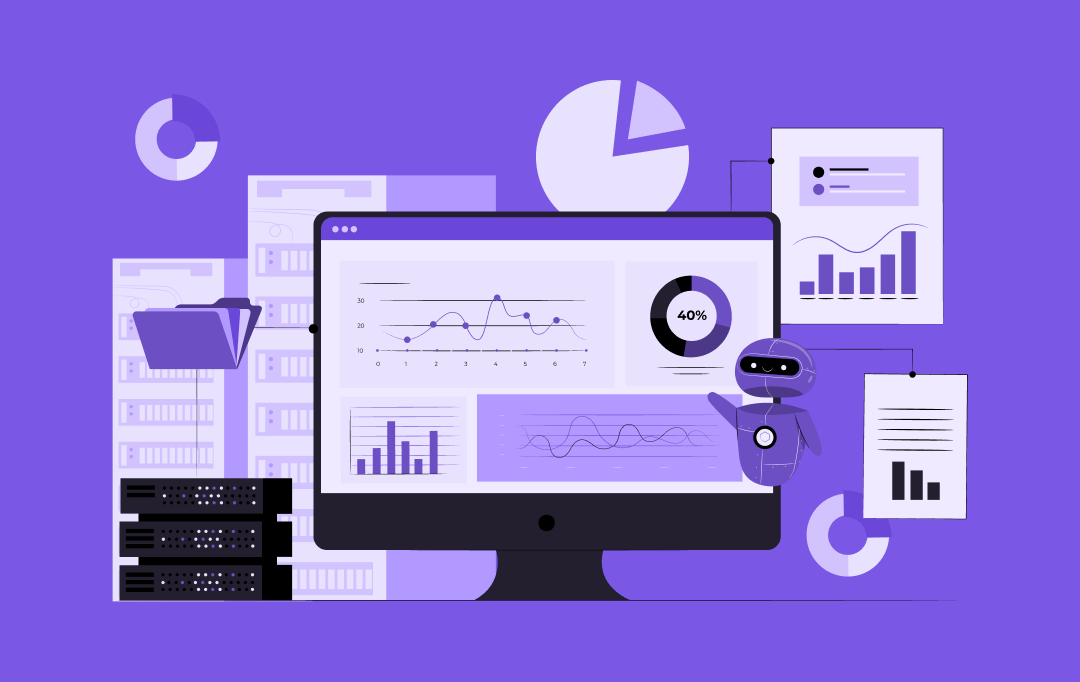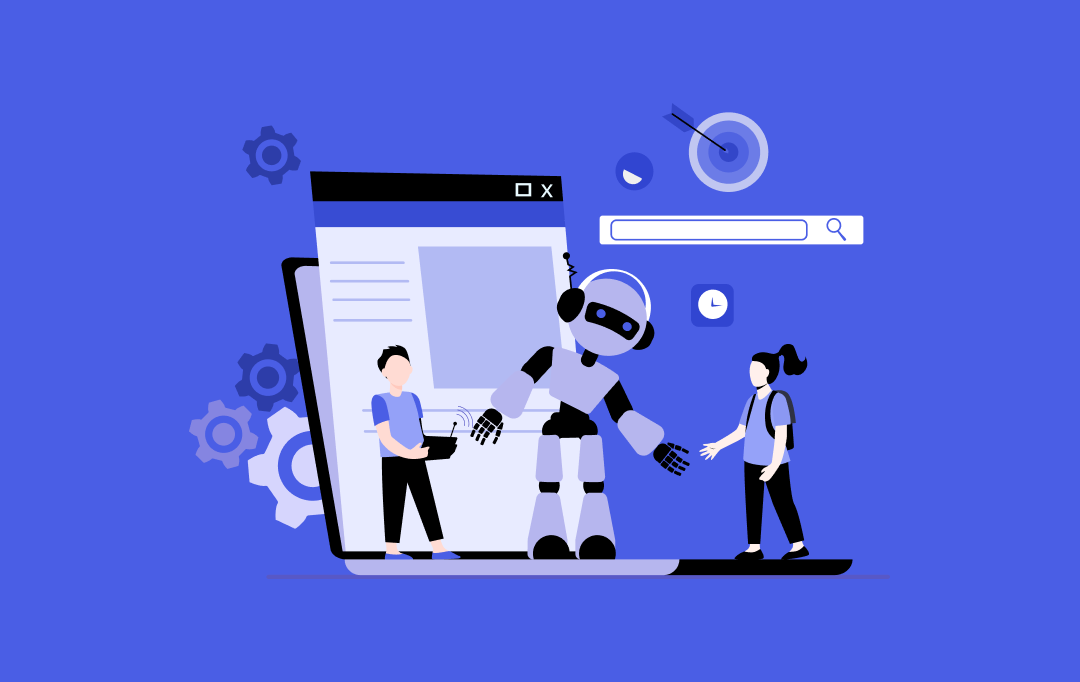- What is Deep Tech?
- Understanding the Benefits of Deep Tech for Modern Businesses
- Use Cases of Deep Tech across Multiple Sectors
- Healthcare
- Transportation
- Energy
- Manufacturing
- Financial Services
- Information Technology
- Defense
- Retail & Ecommerce
- Examples of Leading Organizations Utilizing Deep Tech to Enhance Their Business
- Challenges of Deep Tech Integration for Businesses
- The Pioneering Future of Deep Tech: Unlocking the Possibilities
- How Can Appinventiv Help You Leverage Deep Tech?
- FAQ’s
Deep Tech is revolutionizing industries by introducing relentless innovation and cutting-edge advancements. It’s reshaping the boundaries of what’s achievable in various sectors, including finance, healthcare, manufacturing, and entertainment.
Embracing Deep Technologies leads to significant changes, new ways of solving problems, and the creation of innovative business models. This ongoing development challenges existing norms and paves the way for major transformations in various industries.
In 2021, the Deep Tech market made $431.1 million in revenue. This shows the huge interest and investment potential in this emerging space. Experts predict that the growth of Deep Tech will be really impressive in the future with the estimated market valuation of $3.7 billion by 2032. That’s a massive 21.8% compound annual growth rate between 2022-2032.

This exponential growth shows Deep Tech will likely play a major role in shaping industries globally. In this article, we’ll explore how Deep Technologies are impacting industries. In addition to this, this blog will delve into multiple Deep Tech examples, benefits, and challenges for businesses worldwide. But first, let’s start with the basics.
What is Deep Tech?
Deep tech refers to advanced technologies rooted in scientific discoveries or engineering innovations. Unlike consumer apps and incremental tech, Deep Tech uses radically new approaches, breakthroughs in research, and substantive technical advances to drive change.
Deep Tech examples include artificial intelligence, robotics, blockchain, quantum computing, synthetic biology, and augmented reality. The knowledge intensity and technical complexity inherent to Deep Tech leads to products and solutions with broad, transformational potential.
Not all cutting-edge technologies are truly “deep” tech. Generally, such innovations can be categorized into three categories:
- Shallow Tech: Shallow tech just makes small fixes to existing solutions. For example, software that helps a business run an online shop better isn’t groundbreaking. It doesn’t have a big impact beyond immediate issues.
- Deep Tech: Deep tech aims to solve problems profoundly. For instance, autonomous vehicle systems use AI and machine learning to optimize traffic, increase safety, and reduce emissions. This tech could improve millions of lives – that’s deep.
- Hardcore, Cutting-Edge Deeper Tech: The deepest tech is futuristic and visionary. Things like quantum computers, regenerative brain chips, and deep space travel technologies. This hardcore Deep Tech could reshape our world, but it needs big advances first.
The key point is that the deeper the tech, the more radically it aims to change the world through visionary innovation. Shallow tech makes life easier, Deep tech solves big problems. The most cutting-edge Deep Tech pushes the limits of what’s possible for the future. All are important levels of technological progress.
Understanding the Benefits of Deep Tech for Modern Businesses
Exploring the advantages of deep tech reveals a gateway to innovative solutions and progress. It is vital to understand that integrating these advanced technologies can reshape your business’s trajectory. Here are some of the key benefits of Deep Tech for businesses:

Solving Complex Problems: Where existing techniques hit limitations, Deep Tech provides new inroads to overcome challenges previously thought intractable. Fields like quantum computing promise solutions to problems beyond classical computers’ reach. Science-based techniques open up new approaches to innovation.
Enhanced Efficiency: Deep tech in AI and robotics has huge potential to substantially automate tasks and optimize processes to improve efficiency across functions. Systems can operate with less downtime and minimal errors. Resources can be allocated in a highly precise, data-driven manner to boost productivity.
Higher Quality: Deep tech’s engineering precision and scientific insights lead to significant leaps in quality control and consistency. Products and services can be elevated to new heights of performance and reliability. Defects and variability are reduced through sophisticated techniques.
Platform for Innovation: Deep technologies expand the boundaries of what’s possible, providing a platform for downstream creativity we cannot foresee today. Future opportunities will be opened as technical barriers fall and understanding grows. Whole new categories of solutions could arise.
Sustainability: By enhancing efficiency, reducing waste, and enabling closed-loop systems, Deep Tech can significantly decrease environmental footprints across industries. Natural resources can be used optimally; advanced techniques can transform and neutralize carbon emissions.
Personalization at Scale: Deep tech allows for data-driven customization and individualization, even for millions of customers. It enables bespoke solutions tailored to each user. Demand can be closely matched with relevant supply in a granular way. Satisfaction increases through relevance.
New Capabilities: Rather than incrementally improving the old, Deep Tech provides wholly new capabilities previously impossible. It pushes past limits to define new technological frontiers. Problems assumed intractable become solvable. Deep tech can augment human abilities in unprecedented ways.
Use Cases of Deep Tech across Multiple Sectors
Deep tech innovations are reshaping industries across the globe, presenting groundbreaking applications that span across healthcare, finance, manufacturing, and beyond. Here are some of the most compelling use case of Deep Tech:

Healthcare
Deep Tech in healthcare enables more accurate diagnostics, personalized medicine, advanced gene therapies, robotic surgery, and improved drug discovery. Machine learning analyzes radiological images to identify tumors and other abnormalities earlier than human doctors.
AI also screens DNA tests to determine targeted treatments based on a patient’s genetics. Furthermore, Quantum computing could accelerate pharmaceutical R&D by rapidly simulating molecular interactions. Additionally, Advanced robotics assist surgeons with enhanced precision, flexibility, and miniaturization.
Transportation
The transportation industry is growing with autonomous vehicles, improved navigation, lightweight materials, and enhanced logistics. AI in automotive plays a crucial role in this evolution, with deep learning algorithms interpreting visual data to navigate self-driving cars and trucks.
Furthermore, Quantum sensors provide ultra-precise positioning. New materials developed through computational modeling create lighter, stronger vehicle components. Additionally, route optimization algorithms enable efficient fleet management and delivery.
Energy
One of the most innovative use cases of Deep Tech can be seen in the energy sector. Deep tech is driving the transition to renewable resources and smarter, more resilient grids in energy, leveraging advanced batteries to store electricity from solar and wind cost-effectively.
Furthermore, new catalysts split water into clean hydrogen fuel. Additionally, quantum techniques are employed to identify materials capable of absorbing carbon emissions, seamlessly integrating with machine learning to balance electricity supply and demand in smart grids.
Manufacturing
Smart factories are emerging based on industrial IoT sensors, adaptive robotics, AI process control, and advanced simulation. Sensors monitor equipment performance and feed data to machine-learning algorithms that optimize workflows.
Robotic arms repetitively handle delicate parts with precision. Furthermore, computer vision inspects products for minute defects. Generative design also produces novel, efficient product architectures.
Financial Services
In finance, robo-advisors automate wealth and investment management using algorithms built on academic research in data science and finance. For cybersecurity, Deep Tech in AI systems detects patterns indicative of fraudulent transactions in real-time, reducing risk.
Blockchain enables transparent, tamper-proof accounting between institutions. Additionally, Deep technologies mitigate persistent challenges in risk analytics, compliance, security, and more.
Information Technology
Deep tech in technology innovation pervades leading-edge IT systems, enabling natural language processing, computer vision, quantum, and edge computing. Virtual assistants interpret and respond to natural speech.
Furthermore, drones analyze imagery to identify domain-specific objects. Quantum algorithms solve optimization problems beyond classical methods. Additionally, AI recommendation engines customize user experiences by leveraging 5G networks and edge computing power immersive technologies.
Defense
Deep tech in the defense industry is all about integrating AI, drone surveillance, augmented reality, quantum communications, and new materials. Computer vision autonomously monitors secure locations.
Furthermore, AI fleet management coordinates teams of unmanned vehicles and augmented reality provides enhanced sensory experiences. Additionally, quantum encryption protects battlefield transmissions from interception.
Retail & Ecommerce
In retail, deep learning predicts purchasing patterns and optimizes inventory. Computer vision analyzes in-store activity and smart warehouses automate order fulfillment with advanced robotics.
Blockchain further establishes trust for peer-to-peer product exchanges and drone delivery lowers last-mile costs. Additionally, virtual try-on technology enhances digital experiences.
Examples of Leading Organizations Utilizing Deep Tech to Enhance Their Business
Innovative companies utilizing cutting-edge scientific discoveries in AI, robotics, AI-powered biotechnology, and quantum computing to develop groundbreaking products and business strategies with significant societal and industrial implications fall under the classification of Deep Tech-enabled enterprises.
A Boston Consulting Group (BCG) study reveals that the Deep Tech sector has maintained a consistent 20% portion of venture capital investments, a substantial increase from approximately 10% a decade earlier. This statistic points towards the growing recognition of the transformative potential of Deep Tech innovations across various industries. Let’s look at the multiple businesses that are capitalizing on this trend.

- Carrick Therapeutics: Carrick Therapeutics employs deep technology to identify innovative cancer treatments. By targeting precise genetic mutations, they developed specialized therapies. These precision medicines effectively attack tumors while minimizing side effects.
- Enterome: Enterome utilizes advanced Deep Tech to build microbiome therapies for diseases like inflammatory bowel disease and cancer. Applying complex sequencing and bioinformatics, they analyze the intricate gut microbiome to identify innovative drug targets.
- Hemab: Hemab is a biotechnology firm specializing in utilizing Deep Technology to create gene therapies for hemophilia and related bleeding conditions. They leverage sophisticated gene editing and delivery techniques to produce safe and efficient treatments with curative potential for these ailments.
- Sateliot: Sateliot, a space technology firm, employs Deep Tech to create a worldwide satellite-centric Internet of Things (IoT) infrastructure. By harnessing sophisticated satellite systems and artificial intelligence software, they offer instant connectivity to IoT devices worldwide, even in distant and underdeveloped regions.
- The Climate Corporation: The Climate Corporation utilizes advanced technology to assist farmers. Combining weather predictions, artificial intelligence, and data analysis, they provide personalized suggestions on planting, harvesting, and managing crops to optimize yields and lessen environmental impacts.
- NVIDIA: Initially focused on GPUs, Nvidia has grown to include deep learning, AI, and high-performance computing. Its platforms accelerate computing for data analytics, research, and autonomous systems, catalyzing innovation across healthcare, automotive, finance and more. Though foremost in hardware, NVIDIA’s software advancements also drive progress.
The growth of deep tech-enabled companies is surging. This advancement is driven by progress in Deep Tech trends such as AI, ML, biotechnology, and more. Individuals have opportunities to benefit; some options include partnering with these firms, investing in them, or pursuing careers in the deep tech sector.
Initiating a venture and collaborating with AI development companies opens avenues, too. This allows leveraging cutting-edge technology to enhance products and services, streamline operations, and gain a competitive edge. Investing in deep tech startups or acquiring skills in areas like AI and biotech also provides opportunities for innovation in a rapidly changing market landscape.
Challenges of Deep Tech Integration for Businesses
While deep tech offers transformative potential, it also introduces a set of unique challenges, including complex development processes. Let us look at some of the major challenges of Deep Tech in detail below:

- Complexity: Deep tech solutions regularly involve intricate algorithms, technologies, and scientific ideas. Understanding and applying these solutions necessitate specific knowledge and mastery, which can be hard to obtain and include into current systems.
- High Costs: Creating deep tech requires major investment in research, development, and infrastructure.
- Regulatory Hurdles: Deep tech innovations in biotechnology and healthcare can face strict rules and high standards. Moving through complex systems of regulations and getting approvals can slow release and raise costs.
- Ethical Considerations: Applying deep technology in biotech and AI raises ethical worries over privacy, data security, and misusing these advances. We must carefully oversee, remain transparent, and make responsible choices when developing and deploying to address these considerations.
- Talent Shortage: The shortage of professionals skilled in Deep Technology like AI, machine learning, and quantum computing poses major hiring and retention obstacles.
When addressing the intricate challenges associated with deep tech integration, such as talent shortage, complexity, high costs, regulatory hurdles, and ethical considerations, a specialized approach is essential. Engaging with a dedicated AI app development firm like Appinventiv that possesses extensive expertise in deep tech can present a strategic solution to these obstacles.
This collaboration not only helps in overcoming the talent shortage by granting access to a proficient team but also enhances the development process efficiency, ensuring compliance with regulatory requirements and ethical standards, all while effectively optimizing expenses.
The Pioneering Future of Deep Tech: Unlocking the Possibilities
Deep Tech may profoundly change the world, where the future of Deep Technologies seems promising. AI could detect cancer before symptoms appear. Nanobots may repair cells, and new propulsion could let us explore planets.
Tech innovators build upon science to develop revolutionary abilities. Their impact will change many parts of life. Machine learning and predictive analytics will be everywhere, from personal health to self-running supply chains. Narrow AI will eventually improve to match human thinking and context switching. AGI could be our biggest tech change as it helps and boosts how we think.
Quantum computing will render encryption methods obsolete and solve complex problems too hard for conventional computers. Quantum sensors may find phenomena invisible before, while quantum networking allows perfectly secure communication. Atomic-scale transistors yield unimagined computing power and capabilities beyond today’s limits.
Advancements in genomics and gene editing will unlock the human body’s hidden healing powers. Synthetic biology could produce renewable resources while biocomputers would monitor bodily functions. Diseases once deemed incurable may become preventable or manageable through biotechnology innovations.
As nanotechnology and molecular engineering advance, sustainability will emerge. Atomically-precise creation of stronger yet lighter materials and cost-effectively molecular recycling may reverse pollution. Renewable fusion or decentralized fission could power the world cleanly.
With Deep Tech, we can push humanity forward to overcome limitations and reshape the future if we use technology responsibly. Furthermore, businesses can anticipate groundbreaking advancements with Deep Tech, setting the stage for enhanced innovation and operational efficiency across various sectors.
How Can Appinventiv Help You Leverage Deep Tech?
Deep tech has great potential to solve hard problems with innovative methods. Areas like AI, robotics, nanotechnology, and quantum computing are ready to power the next big change. Deep tech will bring new ideas as it joins more organizations, which lead corporations to create things we can’t imagine yet.
As pioneers in AI development services, our experts at Appinventiv can help you power the next frontier of intelligent solutions. By leveraging our deep industry insights and cutting-edge technological capabilities, we can guide you through the complexities of integrating advanced technologies into your business operations.
Our approach ensures that you not only keep pace with the rapid advancements in your sector but also gain a competitive edge by pioneering innovative applications of deep tech. Get in touch today to learn about Deep Tech’s great possibilities for your business.
FAQ’s
Q. How is Deep Tech different from other technologies?
A. Deep tech provides radical solutions to complex issues, not superficial fixes. It utilizes scientific innovations and engineering advances to progress difficult problems profoundly. This knowledge-intensive approach expands possibilities.
Q. Which industries are adopting Deep Tech the fastest?
A. Deep tech advances across multiple industries. However, we observe quick integration in areas pushing limits such as biotech, self-driving vehicles, quantum computing, robotics, and renewable power. Healthcare, manufacturing, and finance also lead in employing deep tech.
Q. How can companies overcome challenges in adopting Deep Tech?
A. Moving forward with flexible collaboration and specialized talent can help in building robust solutions. Businesses can consider partnering with specialized firms like Appinventiv that brings a wealth of experience and expertise in Deep Tech, providing the necessary guidance and technical know-how.
Furthermore, educating the stakeholders on benefits of integrating Deep Tech technologies also helps in overcoming the challenges. This strategy enables companies to progressively refine their technological capabilities while adapting to emerging challenges and opportunities. It underscores the importance of a dynamic approach to innovation, fostering an environment where continuous learning paves the way for success in the deep tech landscape.



10 Ways AI is Transforming the Healthcare Sector in Australia
Key takeaways: Generative AI could add $13 billion annually to Australia’s healthcare sector by 2030. AI is already transforming operations across diagnostics, admin tasks, and patient care. Healthcare in remote areas is improving with AI-powered virtual assistants and monitoring tools. AI can help address workforce shortages by automating routine tasks and supporting clinical decisions. Major…

Exploring the Power of AI in Creating Dynamic & Interactive Data Visualizations
Key takeaways: AI transforms data visualization by providing automated insights, interactive dashboards, and NLP, thereby tackling revenue loss and improving data quality. Key features include predictive analytics, real-time data integration, and user-friendly visualizations, enabling faster and more informed decisions. Top 2025 tools, such as Tableau, Power BI, and Julius AI, offer NLP and real-time analytics…

Practical Applications of AI as a Service for Your Business
Key takeaways: AIaaS enables fast, infrastructure-free AI adoption. Used across industries for automation and insights. Real-world examples show proven business impact. Pilot-first approach ensures smooth implementation. Key challenges include data, cost, and scaling. Trends include ethical AI, edge, and SME growth Imagine being able to cut down your operational costs while simultaneously improving decision-making and…

















